#but a sort of societal embodying.
Text





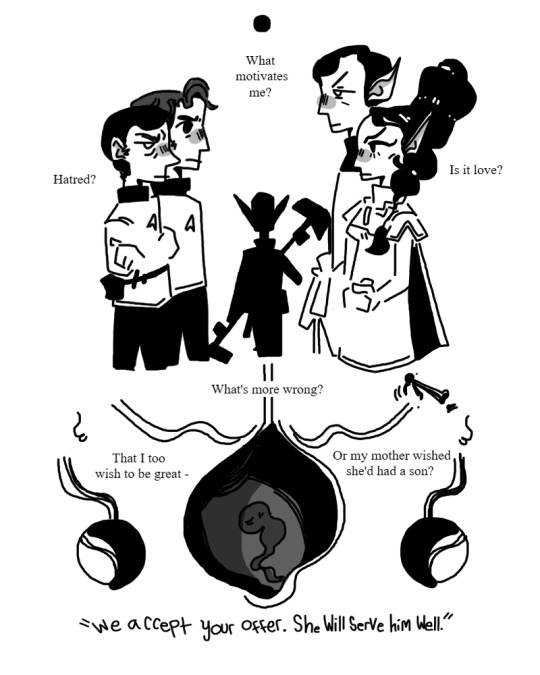
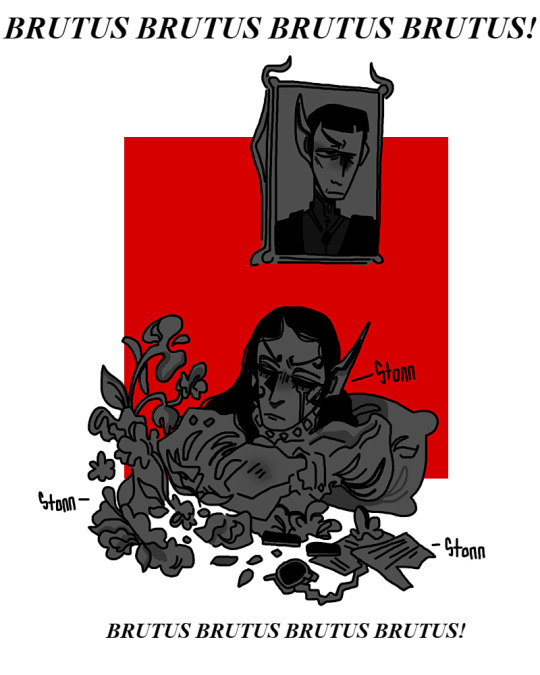
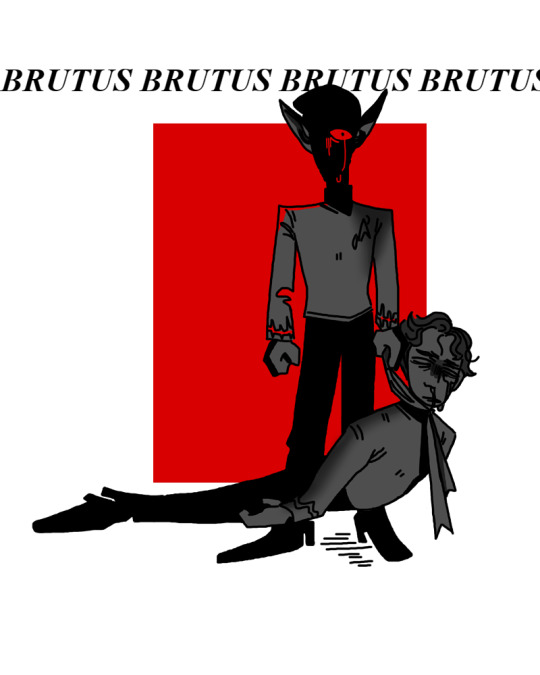
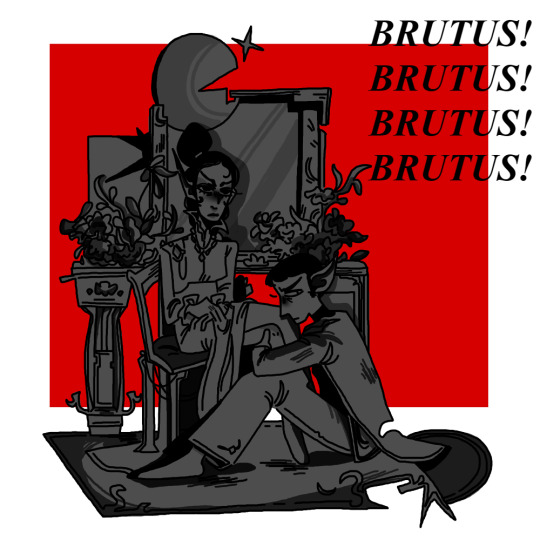
My name is [BRUTUS] and my name means [HEAVY]
so with a [HEAVY] heart I'll guide this dagger
Into the heart of my enemy

Something about having absolutely no choice in who you marry. About being literally forced by the law to spill blood - to accept this stranger as your husband over a man you truly care for or accept the fact that the man you love might die because you put him in danger. Something about risking becoming the wife of a man you've never even seen before a few minutes prior because you know anything would be better than putting your beloved in harm's way. Something about the trust inherent in that decision and in the way she speaks of it after.
Truthfully, T'Pring doesn't know the captain and she doesn't know Spock. Either one of them could have taken her as their wife but she does know Stonn. She knows that Stonn will remain by her side no matter what. They made a plan together. They have an agreement which T'Pring believes will be upheld even though the plan changed with the arrival of Kirk. Stonn will always be there, always, and Stonn will be hers.
Something about the language used around T'Pring: Ownership, subservience, non-personhood. T'Pring is an object that Spock can win. She cannot reject him, she has no say in the matter other than having Stonn 'claim' her instead. Even when Spock leaves after being very clearly rejected by T'Pring he says "Stonn, she is yours." as if despite her clear rejection he still owns her and is must formally 'give' her to Stonn. But the language T'Pring uses around Stonn is a break from that: "There was Stonn who wanted very much to be my consort, and I wanted him."
Stonn who wanted very much to be HER consort and she WANTED him. The language here is very particular - It's not, for example: "Stonn wanted me to be his wife" - he is HERS. And she WANTS him. There's a mutual affection there and a strong trust - a trust which seems to be well founded since Stonn (though silent) stands by her side at the end of the episode. <- That might seem small but if Spock would reject her for 'daring to challenge' (again, the language is not 'because I don't want you' but more of an implied disgust at her having the AUDACITY to reject him) then it's not a stretch to assume that it'd be considered an insult in the TOS Vulcan society to NOT choose Stonn as her champion after a prior agreement.
Anyway T'Pring was a woman in an impossible situation within a society which saw her as more of an object than a person and she wanted Stonn and Stonn wanted to be hers and she trusted that he would understand if she had to publicly pick someone else to ensure his life would be spared and he did understand.
#amok time#T'Pring i s....T'Pring she....-puts my head through a wall-#PLEASE read under the cut for my rambling about T'Pring in amok time pleasepleaseplease#tired of 'T'Pring is evil/a bitch' and VERY uninterested in 'T'Pring is a girlboss'#T'Pring is a person in a society which doesn't think she has the right to make her own choices who's in [love] with a man who [loves] her#back in what I'd like to think is implied to be a slightly subversive way in its mutual and fervent nature (whether the writers thought#this was a good or bad thing - who knows. We know better RIGHT??)#and yes I will stylize T'Pring's hair differently every single time I draw it HEHEHE#star trek tos#Spock#T'Pring#also of COURSE something something spock/kirk & stonn/t'pring parallels: To keep your beloved safe you have to force someone else to kill#theirs - not BC you hate him (you don't) but you don't love him either and why does HE get to have you even if you don't want him?? Why doe#he get to 'give' you to the person YOU chose?? It's not a hatred on a person level (which I wanted to portray with the 'brothers') portion#but a sort of societal embodying.#I will think about T'Pring not wanting to be 'the consort of a legend' every damn day !!!#They really could have laid it on thick in making her evil guys...T'Pau even makes a comment about Spock's 'vulcan blood is thin'#but all T'Pring says is that Spock is a legend and she doesn't want that for her life. She wants Stonn.#And you're gonna sit there and you're gonna tell her that she's wrong!??? Spock doesn't even want to be with her!! Why is she so hated!?#CAN WE FREE MY GIRL??? She did all that but it's being read in the worst faith possible!!#comix#bea art tag#star trek art#She literally says the word 'FREE'...she's TRAPPED!!!
241 notes
·
View notes
Note
How did you realize your bisexuality was actually comphet?
mostly time, i think. i also at one point just started identifying to people as a lesbian before i was 100% sure and even though it felt a little bit wrong, because i just figured if i leaned into it for a while and it still felt really wrong then i could say ah actually i was wrong everybody, i’m bi! and no real harm done. but eventually it did start feeling like the more correct label for myself, and i realised that the “attraction” i had to men was very much more about enjoying the chase and the complicated dance of the heterosexual dating dynamics; i was essentially just toying with men and i found that fun and the attention was validating, but i never took anything emotionally seriously at all because it was all kind of just a game.
ultimately when i got a little older and realised that maybe i did want a solid, valid intellectual and emotional connection with somebody, i just literally could not imagine in any capacity that a man could be what i needed. like even now i just cannot fathom any world in which i can lay in bed at 3am and talk about the intricacies of what it feels like to be me with a man that i know just isn’t really going to get it— i would always feel there was some unbreachable gap between us and i’d never feel like it was quite enough for the romantic connection i demand with partners.
#like imagine trying to speak to a boy about sylvia plath or something sawry but that is not happening for me lmao#there’s just so much also in the socialisation of like What It Means To Be A Boy that is unpleasant for me to be around!#but even if all of that is aside and i were to find this mystery fantasy man who does not embody any of the unpleasant traits#of societal expectations of masculinity etc#at the end of the day i would still feel like we were speaking just slightly different dialects of the same language#and i just know i’d never be able to fall in love w somebody who didnt have my exact mirrored language#if this all sounds very self serving and like i’m thinking of myself as more internally rich and importsnt than men that is because i am 🤍#kidding. sort of#answered#anonymous
8 notes
·
View notes
Text
decade accurate marauders era wardrobes - sirius black
hair: black, wavy, and shoulder length.
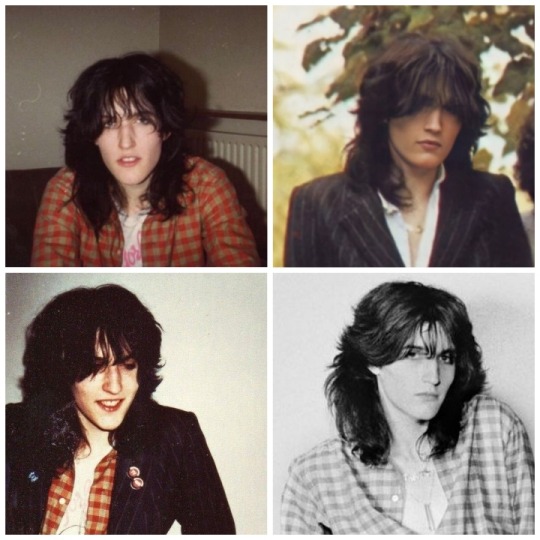
while long hair for both women and men was popular in the 70s, the trend carried over from the later years of the 60s.
the 1960s was a decade characterized by youth rebellion and societal revolution. the decade was rife with countercultural movements such as racial equality, women's liberation, and queer rights. pushed largely by baby boomers, the young people of the 60s rejected the conservative values of their parents and the generations before them and instead valued equality, individuality, and self-expression. these values inspired the fashion of the 60s, which is why later 60s fashion trends consist of brighter colors, shorter hemlines, non-western influences, and long hair on men.
i'm not sure if sirius having long hair while he was younger is canon, but even if not it makes sense for his character. sirius practically embodies the larger societal reckonings of the time as he struggles with separating himself from his long, bigoted family history and subverts the expectations for him by actively fighting against it and carving out his own self image free from his familial legacy.
clothes: consist mainly of blacks, purples, reds, and silvers. leather, velvet, furs, and fishnets. ripped tops, colored pants, slogan tees, and a copious amount of band t-shirts.
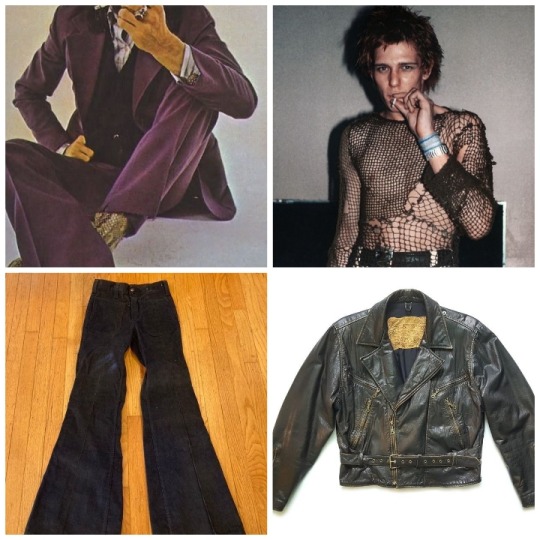

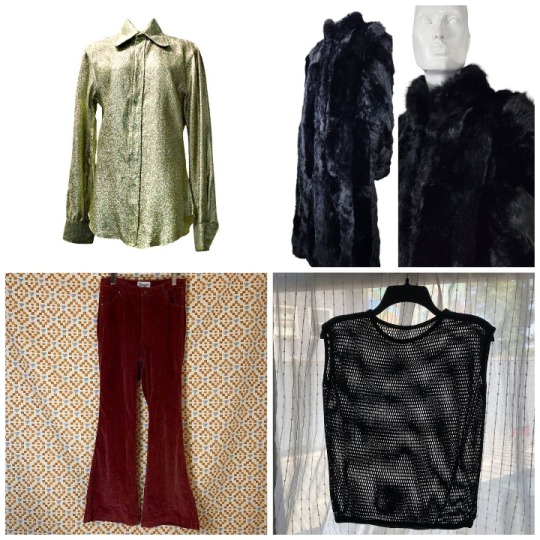
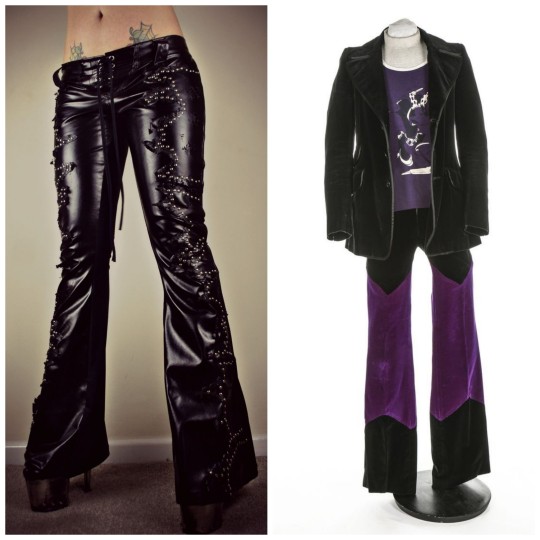
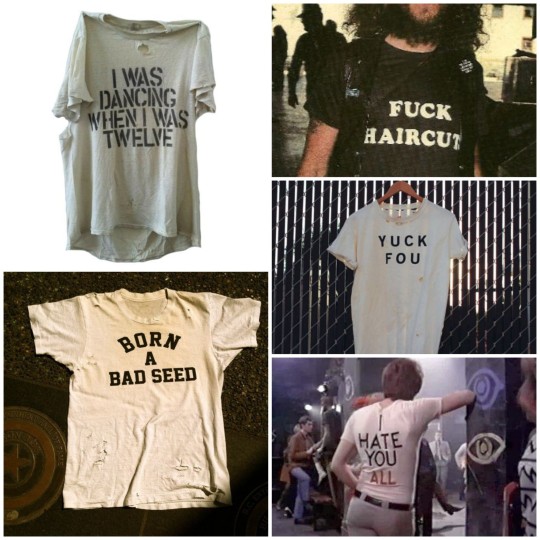

glam rock is a british fashion subculture that emerged in the early 70s and was pioneered by various musicians such as marc bolan and david bowie. glam rock fashion allowed participants to play with gender norms with the men wearing typically "flamboyant" feminine clothing made with velvets, silks, furs, and glitter.
punk rock is also a british fashion subculture that came about in the mid 70. although having its roots in glam rock, punk rock visually seems like the exact opposite with its fashion pieces consisting of leather pants and jackets, combat boots, altered t-shirts, and body modifications such as tattoos and piercings.
for the longest time i haven't been able to choose between whether i think sirius would dress glam or punk. i think he'd like certain elements of both so i tried my best to combine them together.
he'd love t-shirts. they seem common today but before the 60s they were worn as underwear. during this decade t-shirt printing became easier and more accessible, and thus began the trend that was the slogan tee. you could get t-shirts with almost anything printed on them, short phrases, crude jokes, and band logos.
shoes: platform shoes, combat boots, and converse.
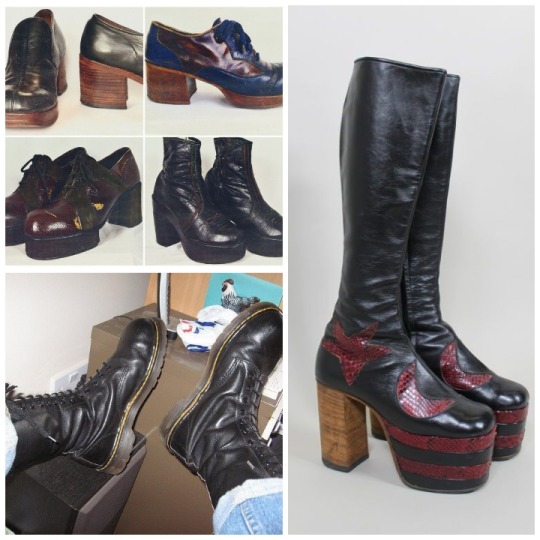
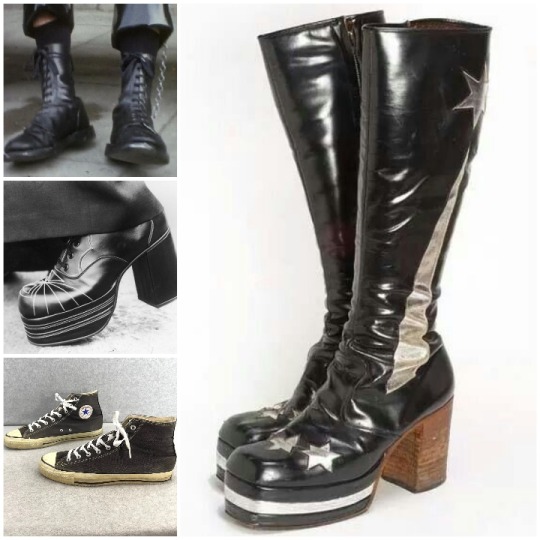
platforms platforms platforms
combat boots, specifically doc martens, were a staple in punk fashion
the converse are for casual wear
accessories: motorcycle gloves, star shaped belt buckle, buttons, patches, and sunglasses.
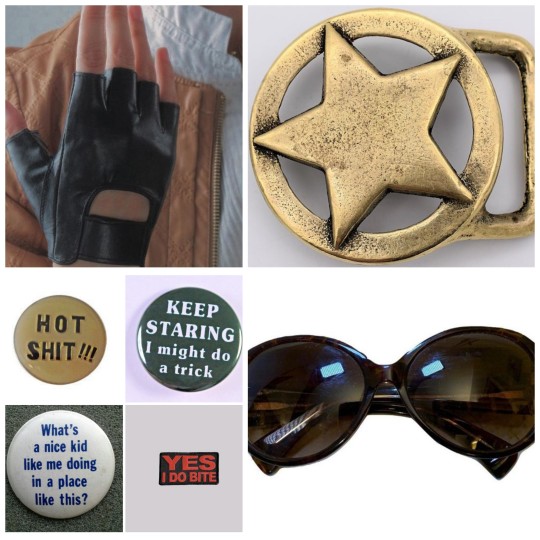
i couldn't find any good pictures or an actual belt that i liked but i feel sirius would love statement belts with a big buckle that has some sort of design on it
the patches and pins are for his infamous leather jacket™ i'm pretty sure his leather jacket isn't canon but it might as well be anyways 🤷🏿♀️
#after 5 million years i finished with sirius' everybody cheered#i have to be at work all weekend so i probably won't be able to post anymore this weekend but i definitely will next week#the plan is to do remus and then marlene dorcas mary and pandora (in no order)#maybe peter? i have a few ideas but i'm not sure#sirius black#marauders#marauders era#the marauders#the marauders era#mwpp#mwpp era#decade accurate marauders era wardrobes#not vintage
398 notes
·
View notes
Note
(1st off, i am a trans man) personally, it makes me slightly uncomfortable when other trans men center their own experiences. don’t get me wrong, we have a right to talk about our issues, but i can’t help but feel like there’s a victim complex going on when some guys say that TERFs are “just as dangerous” to trans men or that baeddelism is a relevant issue (while brushing the misogyny and toxic masculinity in the ftm community under the rug). the fact that you made a post about trans unity and the first ask you got was about how trans men aren’t supported enough by trans women? but like, is that true? is it not ALSO an issue that trans women aren’t supported enough by trans men?
Okay, I hear you, and I acknowledge that I (unfortunately) have fairly limited experience with trans men but I don't know if I like the idea of discounting what they have to say as "a victim complex."
They just want to be heard. And I think they have a right to be upset, given how little representation trans men are given in media. I never saw any discussions on transmasc issues until I came to Tumblr. Never saw it on YouTube or Reddit. Online leftist circles--and even online trans circles!--don't talk about trans men! So, y'know what? If they're being a little melodramatic about their issues, maybe it'll off-set the lack of any knowledge of their issues in the first place.
And also, I think toxic masculinity and misogyny are sort of part of being a man, right now? Which certainly isn't to say it's inherent to men, but society does encourage it. That's what I think should change about being a man. This goes back to societal misandry, I think. Toxic Masculinity is just a manifestation of societal forces that encourage men to behave in unhuman ways, and I think it would be immature of me to expect trans men to perfectly avoid that, in their pursuit of masculinity.
Gender is a performance. We are all looking for the role that makes us most comfortable, but the baggage attached to the roles isn't something you can side-step so easily. Cis people have an advantage on this front, in that they are capable of proving their masculinity or femininity via means other than pure performance. Society *expects* them to be men or women and that means they can gesticulate towards genitalia whenever they're called into question. (They don't always do that, and it's sort of transphobic when they do, but the ones who are comfortable with themselves might say something like that, all the same)
A trans man will uphold toxic masculinity the same way that a trans woman will submit herself to misogyny: it is in pursuit of the perfect encapsulation of the role. Unless we feel like we adequately perform the role inherently, we are inclined to tolerate--and ergo embody, to an extent--the negativity present in the roles we desire.
I believe that lowering the standards for who can be seen as valid in masculinity will alleviate quite a bit of misogyny, whether that misogyny be among transmascs or cis men. So, in saying that, I hope I also illustrate why I'm quick to jump to their defense while also tacking on my ideas about societal misandry and its toll on men.
On the subject of whether or not transfems actually don't support transmascs...I guess I wouldn't really know. I'm not in trans communities because I don't live in a place where that kind of community could show up. I imagine this problem is being blown out of proportion a little bit, but the ask I think you're talking about did say that it was sort of a Tumblr thing? And internet discourse is just...fuckin...so unbelievably shitty. So I'm not too worried about it.
I mean, I'm not going to immediately assume any transfem I meet is inherently misandristic or otherwise bigoted towards transmascs, but I'm still gonna go to bat for transmascs if they get shit-talked, y'know?
782 notes
·
View notes
Text
One Piece fights are fun to watch, but One Piece itself has never been about the fights primarily - it's about all these themes, the emotions behind the fights. Because Luffy Does What He Wants it's never a question of orders or obligation for him - it's always a question of why does he want to fight? What drives him and others to not give up?
Sure the fights themselves are fun and cool! You know I cheered on fights because I like action scenes! But without that emotional weight behind it, I just wouldn't care?
With the Gear 5 reveal episode it's so cool because it ties into so many of the actual themes of the show and is such a narrative culmination of them that it's extra satisfying to watch.
The comparison I've seen a lot is Dragonball and the SSJ transformation and LET ME SAY RIGHT NOW that I'm not starting a fight here about what's better/more epic - I'm a longtime dragonball enjoyer I watched and rewatched that show years before most of you were alive. And while the SSJ transformation is extremely cool and ties in with Goku's character (i.e. that it's not selfish anger that gets him there) and expands on the Lore it's not really tied in with any of the shows themes as such, simply because that's not the sort of writer Toriyama is.
One Piece on the other hand is full of themes that the narrative builds itself on, especially of authority and freedom, about societal norms and how/why you might want to break them - something that is a quintessential pirate narrative btw.
When it was revealed that Luffy was the reincarnated Warrior of Smiles and Liberation I gasped, because it was always him, it could have only ever been him, because he has always made people laugh, has made them free (both physical and emotional, figuratively and literally) has only ever really cared about freedom - of being as free as possible, living without regrets and restraint and the thought that in a way the Devil Fruit chose him for those qualities, for the embodiment of freedom and to have it mirrored in his Awakening and his fight is just such Good Narrative Storytelling it makes me tear my hair out at how good Oda is at it.
(In addition, re the anime staff) cutting it with Hiyori's scene, having that moment of her being finally free of the burden of the last 20 years, of being able to stop enduring but instead giving her pain and pride a voice without having to stifle it is such a great choice to bring home those themes of individual freedom and the catharsis that comes with it...I'm just so !!!! LOOK AT ONE PIECE!! LOOK AT HOW GOOD IT IS!! PLEASE BREATHE IN THE THEMES.
#one piece#one piece spoilers#gear 5#monkey d. luffy#meta#TAKE THIS SHOW AWAY FROM ME I HAVE *THOUGHTS*
314 notes
·
View notes
Note
Have you got any opinions of Left 4 Dead 1/2's cast of survivors?
One thing I've been thinking about a lot lately is when a work of apocalyptic fiction treats the end of the world as a site for personal reinvention. On the one hand it's potent theming, because the questions of how you choose to behave when utterly freed from existing societal constraints, and how you reconstruct your sense of identity after total context collapse, are sort of inherently packaged in with the premise. On the other hand you're kind of playing with fire, because if you treat the apocalypse as something primarily liberatory or empowering for the protagonists I personally often find it offputting. Congratulations! Your personal growth was purchased at the low low price of the death of billions! You can get away with that kind of thing if you take it in a lighter direction and maintain, like, a deliberately mock-misanthropic tone, or play up the inherent comedy of a person whose life sucks so much that the apocalypse represents a step up- but it's a knifes-edge to walk. I've found that a satisfying synthesis is examine that act of personal reinvention as a coping mechanism, a story that the person doing it is telling about themselves in order to deal with the horror of their surroundings. Zone One by Coulson Whitehead and Rot and Ruin by Jonathan Maberry are pieces of zombie fiction that I think use this lens in an interesting way.
I believe that Left 4 Dead is close-to-unique among Valve properties in that they actually released a close-to-standalone self-contained narrative starring game's the principal cast, in the form of The Sacrifice*, and I feel like the comic explored this dynamic in interesting ways, because the four survivors exist on a distribution between "Apocalypse-as-New-Lease-On-Life" and "Turbofucked," in ways that pointedly affect their behavior and outlook.
Louis, the eternal optimist, Certified Gamer, still clad in white-collar garb two weeks into the apocalypse, is revealed to have been the one of the four who had the most going for him before the outbreak, a middle-class job with a well-defined upwards trajectory. His dogged insistence that things will eventually be okay is implicitly informed by how badly his life got upended by all his coworkers going nuts and trying to eat him. On the flip side, though, the comic portrays him as having had the fewest actual interpersonal connections- the only person he interacts with in his flashback is his coworker Ray, and that interaction is defined by how Ray is nowhere near ride-or-die enough for Louis to risk coming into the office at his request. He barely registers that the guy in the bathroom who attacks him is a zombie. Make of this what you will.
Zoey was a step down on the ratchet-she was floundering, but it was a comfortable flounder that's likely familiar to a lot of us. Struggling in college, no direction in life, a would-be creative struggling to turn her interest in fiction into an actual career. Parents separated and at each other's throats- but she had parents, had support, had options even as she was treading water. The apocalypse is superficially her call to adventure, letting her live out the fiction she immersed herself in before the outbreak, and you see glimmers of bravado stemming from that- but that same genre immersion is directly tied to her decision to put down her father before his immunity was apparent, because they thought that they were living out a trope that they aren't. She embodies the gap between the nerdy apocalypse fantasy and the horror of actually living through that.
On the other end of things you have Francis, who's downright gleefully cynical about the apocalypse- marrying the assertation that they're all going to die, and that nothing will ever be okay again, with the claim that the apocalypse as the best thing that ever happened to him. Before the outbreak Francis had a strong social circle but was also slated for prison; the apocalypse eliminated the immediate threat of jail, but his pre-outbreak social circle very pointedly isn't around anymore, in a way he's kind of talking circles around when he brings it up with Zoey; he mainly brings them up in the context of contrasting them with how competent Bill is at navigating the apocalypse, and you can infer that his initial attempt to treat the end of the world like an opportunity for a party didn't turn out so hot. He very badly wants to be the guy who had nothing to lose, the guy who's having a blast, he wants to inhabit that role, but there's an undercurrent of performativity there.
Then you get to Bill, who genuinely had nothing, in a way that inform his post-outbreak behavior in really interesting ways. He had no friends, no family, no purpose, and he wasn't in particularly good health. The apocalypse is, in many ways, straightforwardly a step up from his previous situation, in ways that isn't true of any of the others- now he has friends, a goal, a reason to keep moving. The Sacrifice is interested in how that affects his decision making, for better or for worse- he's myopic, invested in the well-being of an extremely tight in-group at the expense of others, monomaniacally good at fighting the infected in a way that even the other survivors find somewhat unnerving. There's a sense in which the brave new world is Bill-shaped. Admittedly the brave new world killed him dead. But it killed him dead in a significantly more badass way than he otherwise would have died, and on some level that was probably his preference. (I don't really go to Dead By Daylight, but I'm tickled pink by their implication that getting to do asymmetric survival horror multiplayer forever is sort of like a Valhalla situation for him.)
57 notes
·
View notes
Text
It's already been mentioned that in general Jon Snow is more attracted to personality rather than appearance and if I had to pinpoint to what those specific character traits are I would say that it's an independent nature, being a rule breaker and general proactiveness in getting things done.
Ygritte embodied what Jon loved about the Freefolk - a freedom of sorts from Westerosi biases, societal rules and laws. His journey with the Freefolk changes his long held opinions of them and parallels his love for Ygritte. Ygritte is honest and open about her desires, values her independence and often times it is Ygritte who defends and protects Jon Snow.
And though he does not know or love Val as much as he does Ygritte, it's their similar independent nature and not being beholden to others that he again finds attractive.
All the same, the wildling princess was not beloved of her gaolers. She scorned them all as "kneelers," and had thrice attempted to escape. When one man-at-arms grew careless in her presence she had snatched his dagger from its sheath and stabbed him in the neck. Another inch to the left and he might have died.
Lonely and lovely and lethal, Jon Snow reflected, and I might have had her. Her, and Winterfell, and my lord father's name. - Jon, ADwD
Val stood on the platform as still as if she had been carved of salt. She will not weep nor look away. Jon wondered what Ygritte would have done in her place. The women are the strong ones. - Jon, ADwD
And when she wants to help by bringing Tormund's faction to the Wall, Jon lets her, trusting in her capability to go beyond the Wall alone, on a half blind horse, with no protection.
“My lady, you do not have to do this. The risk—”
“—is mine, Lord Snow. And I am no southron lady but a woman of the free folk. I know the forest better than all your black-cloaked rangers. It holds no ghosts for me.”
I hope not. Jon was counting on that, trusting that Val could succeed where Black Jack Bulwer and his companions had failed. She need fear no harm from the free folk, he hoped … but both of them knew too well that wildlings were not the only ones waiting in the woods. - Jon, ADwD
Or when she partners with Jon to help him with Selyse Baratheon - a Westerosi Queen that he is wholly unimpressed with and wants gone from the Wall as soon as possible.
“Let me help.”
“You have. You brought me Tormund.”
“I can do more.”
Why not? thought Jon.
They are all convinced she is a princess. Val looked the part and rode as if she had been born on horseback. A warrior princess, he decided, not some willowy creature who sits up in a tower, brushing her hair and waiting for some knight to rescue her. - Jon, ADwD
And then there is Alys Karstark and the flirty vibes between Jon and her. There is certainly admiration there for Alys on Jon's behalf. Alys who gets on a horse in the harshest of winter, nearly dying trying to reach the Wall and yet doing so in the belief that the son of Ned Stark will help her. Alys who probably grew up hearing stories and songs of the evil Wildlings who rape and pillage and yet agrees to marry one to protect her own inheritance and rightful claim to house Karstark.
Jon turned to Alys Karstark. “My lady. Are you ready?”
“Yes. Oh, yes.”
“You’re not scared?”
The girl smiled in a way that reminded Jon so much of his little sister that it almost broke his heart. “Let him be scared of me.”The snowflakes were melting on her cheeks, but her hair was wrapped in a swirl of lace that Satin had found somewhere, and the snow had begun to collect there, giving her a frosty crown. Her cheeks were flushed and red, and her eyes sparkled.
“Winter’s lady.” Jon squeezed her hand. - Jon, ADwD
We as readers and characters like Jon Snow understand that the Freefolk are just like the other denizens of Westeros - good and bad - and yet there's just so much bigotry against them, especially in the North. So Alys - who has never even met one of the Freefolk - entering into a marriage alliance with the Magnar of Thenns is indeed momentous and extremely brave. It has similarities to Dany's marriage with Hizdahr to sue for peace for her people, to bring about an end to the insurgency by the slavers.
So while Jon can be protective towards the characters he cares about - Arya, Sam, Satin - he also really loves that independent streak in the girls he is attracted towards.
Which is why I am really excited for Jon Snow and Daenerys Targaryen meeting in the books. Even though they have not met yet, I can just sense that palpable chemistry between these two characters based on their personalities. Close in age and maturity, these are two young leaders with a can do attitude, keenly interested in reform and rebuilding a new world. And yeah, Daenerys is really beautiful and yet IMO Jon Snow is going to fall for her personality, regardless of her appearance and not because of it.
And I think that's key considering GRRM's themes of beauty being skin deep and what's important is who we are and not how good looking we are. And despite Jon and Dany not meeting yet, he's laid the groundwork for them getting along like a house of 🔥
130 notes
·
View notes
Text
Nimona: Just Now Got Onto The Hype for This Movie
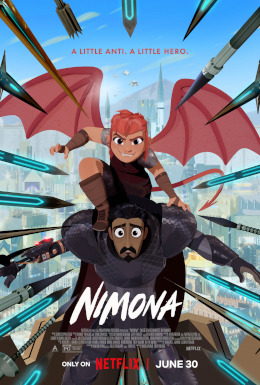
After my first viewing, the movie Nimona was a thrilling, fun adventure with so much love and passion behind it that it makes you want to root for the bad guy and antiheroes once again. This makes you question what side you should support or not. And I love that it makes that kind of statement in the film.
Based on the novel of the same name written by ND Stevenson, they built a story about what it means to be a hero or villain, even going to lengths of what one’s true self is in the face of adversity. There’s also a bonus of a gay couple being at odds with each other like any couple in media.
If you want to watch the most human film of 2023 staring a pink-haired shapeshifter, then let’s get into the deep stuff.
Freedom and Freethinking

Nimona is the character that embodies someone who’s comfortable with who they are, at least on the outside. However, Nimona desperately wants to belong in a world that doesn’t want them to exist. This can mean lots of things, especially being an allegory for being nonbinary or transgender, thus not conforming to society’s rigid expectations.
Ballister Blackheart is the black sheep of the society he was placed into, the outsider that doesn’t feel like they could belong. He was essentially molded into a role meant to change the status quo and was later branded a villain by the kingdom. Sure, he was framed for murder, but he was greatly disliked and mistrusted before for not being of a “noble” bloodline.
Ambrosius Goldenloin is more portrayed as the man stuck between duty and love as he slowly unravels from the changes to the status quo. He still remains loyal because of his status as the direct descendent of the founder to the kingdom. He benefits from the system he resides in unlike Ballister and tries to find a middle ground to what he wants and what is right for the system.
All the people in the kingdom are influenced by their belief that monsters are evil and slaying them is the only option, as well as being affected by the fear of an unknown world beyond the walls. While the people aren’t evil, they aren’t innocent victims either. They still benefit and follow the life built within the walls of their kingdom without questioning anything
Transformation
Each character undergoes some sort of transformation, whether shapeshifting or through emotional growth. Some can be considered good for them and much needed, while other parts are very, very bad for a lot of people. Ballister internally transforms from a warrior to a friend to a monster that can empathize with Nimona’s feelings of isolation. You can even argue that Nimona’s shapeshifting is a representation of being genderfluid and changing their appearance to feel like they’re free.
The Director’s transformation is more negative if anything. She essentially allows her own fears of losing security get the best of her to the point of letting innocent people die than see any other solutions.
What it Means to Be Human

I loved that it doesn’t shy away from making strong commentary on how people make judgements and are motivated by their belief of being right. Around the climax, Nimona transforms into a giant shadowy monster after experiencing all of the pain she’s endured and nearly took her own life because she believed she was a monster. This was a powerful scene because we can understand feeling like no one will love or accept you, but there’s that small act of kindness that brings you back from that darkness.
Now...
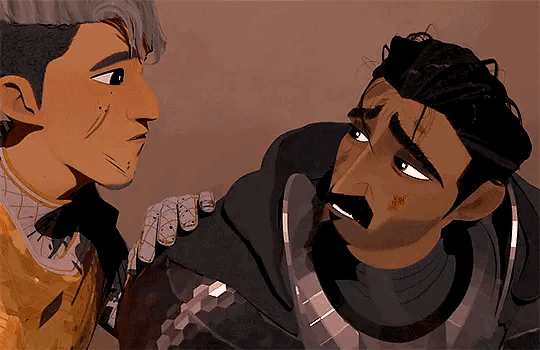
Nimona is a modern classic that deeply explores identity and transformation within their characters in a rich environment and complex themes. This film makes the audience reflect on their own views on what they consider different while understanding self-acceptance and challenging societal norms. It’s a must-see for anyone who feels like an outsider and wants to learn about self-love and freedom from rigid ideas of identity. All I can say is that I’m emotionally exhausted from the rollercoaster of feels that I’ve felt.
#nimona#ballister x ambrosius#ballister blackheart#ambrosius goldenloin#nd stevenson#netflix#nimona movie#eugene lee yang#chloe grace moretz#riz ahmed
155 notes
·
View notes
Text
aaaaaaaaa thinking about how cathy and heathcliff both had the kind of freedom the other one wanted. Thinking about how when cathy was sick she hallucinated their childhood home but when heathcliff was sick he hallucinated (…or was it a ghost oOoOo) cathy as an adult. for cathy their childhood was the embodiment of what she wanted most in life, she wanted to run around and do whatever she wants and get her clothes dirty and have fun without having societal expectations put on her. For her, childhood was a good memory. Child heathcliff is the version she wants to remember most because thats when she felt free and not restricted by the expectations of becoming a lady and getting married. For heathcliff childhood was a terrible memory. He was constantly powerless and abused. He never hallucinates cathy as a child, doesn’t really reminisce on their childhood together. The freedom heathcliff wanted was being seen as an equal and being given the same opportunities as his rich and white peers. Which as a child he was denied at every turn. Only when he runs away he is able to make his own money and return a ‘gentleman’. Even though he is still not viewed as an equal he has at least some sort of power now. He has money, he was able to decide to go off and make money independently. The only way cathy saw herself ever making money was by trapping herself in a marriage. When heathcliff runs away he is not just literally leaving cathy behind, he does so metaphorically as well. Child cathy was free to do whatever she wanted, and heathcliff was trapped by his circumstances. When heathcliff becomes and adult and runs away to make his own money, he gains the freedom and power that only adult men in that society could have. And when cathy becomes an adult she loses the freedom and power. For the reasons ive already listed. I mean obviously cathy was always in a much better position than heathcliff. Her ‘trapped’ was ‘oh noo i married a rich man instead of my true love’ + societys sexism pressuring her into not just independently making money for herself as an option. Heathcliff’s trapped was being forced to be a child servant and constantly being beaten. and racism. But like. Im thinking in terms of broad patterns here. This book is so full of like, cycles and mirror images and parallels and loops. I feel like this could count as one of those. Cathy and heathcliff switching places. They’re so obsessed with eachother because the other one is everything they couldn’t have. Look its 2 am guys so this isn’t really a coherent post i just can’t stop making literary analyses of this book in my head when im trying to sleep.
40 notes
·
View notes
Text
Admittedly, it took me a very long time to figure myself out, and I'm still not done yet, but being open with friends online has allowed me to feel a bit more okay with being open around people in person.
I started by coming out as asexual, as being ace is the one thing I've always been 100% certain of, even when I didn't have a term for it. I'm not sex repulsed, but I have no desire for it. I'm basically indifferent.
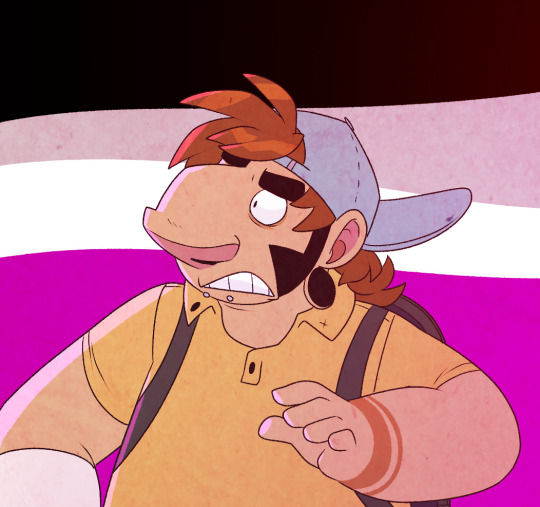
I wanted to make one of my longtime main characters asexual to reflect myself, so I chose Art to take that on. He's equal parts anxious and bull-headed, which puts him at odds with himself. He knows he's capable of handling most any situation, but he's gonna stress about it regardless.
I feel Art and his wife, Rocky, embody a healthy relationship that has zero reliance on sex, or societal norms for married couples. They're in their late 20s-early 30s, don't desire children, and don't have sex. They also have one of the most healthy and strong relationships in my comic series. Rocky is also asexual.
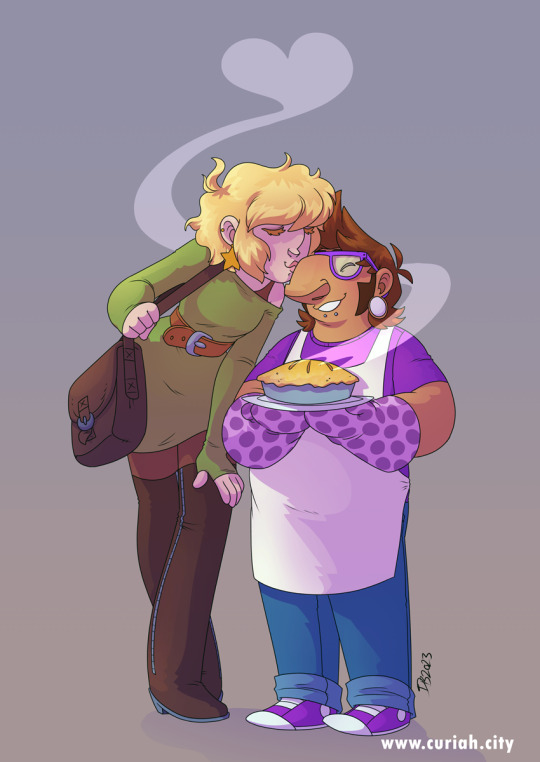
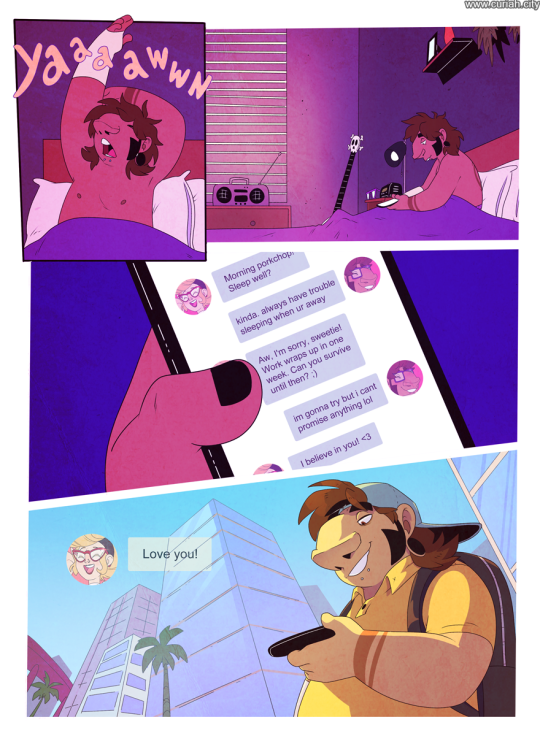
...and then there's Oz, another main who's portrayed as more of a "middle of the road" character morally. A protagonist only in his own life, but can serve to be friend or foe to anyone else. His story involves him having been split from his fiance after she cheated on him, and Oz takes an incredibly long time to find closure within himself, with some unwitting help from Art.
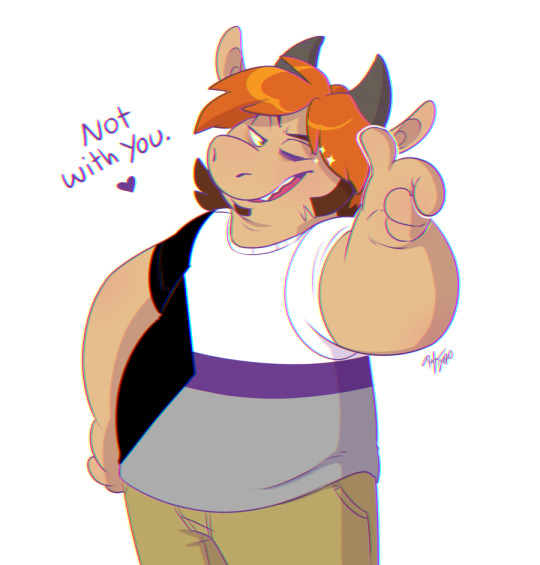
Oz is demisexual and demiromantic, and he personally doesn't find interest in potential partners very often. He's hooked up with another person maybe a few times in his 32 years of living, and he doesn't particularly care to look around. He's in the "if it happens, it happens" boat when it comes to finding a partner. He doesn't actively pine for any sort of romantic or sexual meaning.
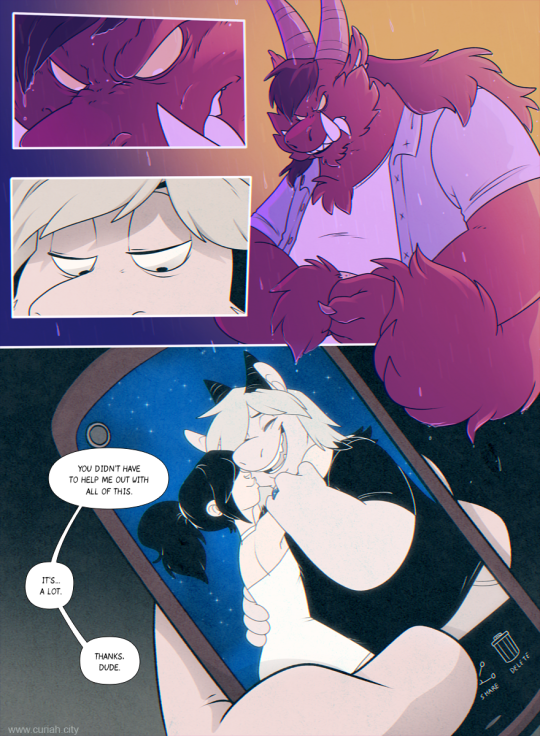

Oh, by the way, they're both shapeshifting monster folks.

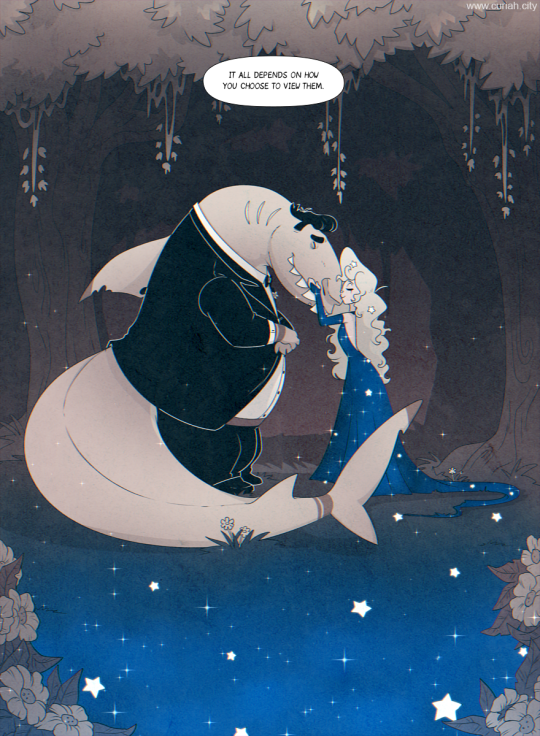
You can read about them and their friends in my cartoony graphic novel series:🌴 @curiahcity🌴
Happy Pride! And remember: Ace people are very real and we deserve respect and understanding .
@acesincomics 💜🤍🖤
125 notes
·
View notes
Text
It's Not Technically Gaslighting
Recently, in my travels, I came across this church sign:

Back in my younger years, I would've seen this, nodded sagely, and said, "Yes. Putting jesus first, others second, and myself last is sure to bring joy. What a clever and profound statement."
Not anymore. Now when I see a sign like this, at best, I roll my eyes. At worst, I go off on a tirade and end up turning around my car to take a picture of the sign so I can rant about it later online lol.
So yeah, here we are.
This message communicates a belief that is so, so essential to modern christianity—which is that you should always put others first. Always. And it is especially emphasized for women, whose entire role in life is supposed to be that of service.
Give, give, give, and never, ever take, they say. You don't want to be a burden, you want to be a blessing. jesus gave everything to save you, so you too should give everything in service to his "great plan." And they use jesus's words to emphasize the point as well:
"Anyone who wants to be first must be the very last, and the servant of all." mark something or other.
"Carry each other’s burdens, and in this way you will fulfill the law of christ." galatians.
"Now that I, your lord and teacher, have washed your feet, you also should wash one another’s feet." john.
"...whoever wants to be first must be your slave—just as the son of man did not come to be served, but to serve, and to give his life as a ransom for many." matthew.
It goes on and on and on. And it's not just the gospels and paul (I fucking hate paul) who harp on it, but practically the entire old testament as well.
But there's a basic logical fallacy inherent in this idea of being the lowest of the low, of being the last of the last, which is this: if everyone is successfully "the last," then doesn't that technically make everyone first? And if everyone is trying to be a slave or a servant or at the bottom of the pile, who exactly is at the top? Maybe the people who want to be at the top? Aren’t the people who don't give a shit about being at the bottom going to slide into leadership roles? The people who are least qualified to be role models? The people who are the worst candidates for leadership?
This creates societal pockets rife with abuse. This system is the perfect opportunity for predators to hunt. And there are so many prey. Everyone who is actually a humble person, who is actually trying to live a good life, everyone who wants to embody the servitude of christ—guess what? Simply because they are trying to be good and live life right, they are going to have to put up with a lot of shit from predators who want power and control. And those predators who benefit from their servitude? They’re going to milk it for all its worth.
That's how you end up with brian houstons and bill gothards.
When I was 17, I was part of the youth group band at my church. It was a mini-mega-church, as I like to call it. We had on average 800+ attendees every weekend, and the church functioned with a sort of corporate hierarchy, with a head pastor and sub pastors, and had the fancy lights and loud music and charismatic sermons you'd expect at a mega church.
Sunday night was youth group, which operated like a full-fledged church service. Kids would come into the sanctuary and us, the band, would play popular christian music. We had a pianist (me), a drummer (my little brother), guitarists, a bassist, and singers. Sometimes we even had brass or woodwinds. They even had a light designer who would do impromptu light shows. And a haze machine.
It was basically a weekly live music concert for teens that lasted anywhere from twenty to forty minutes. Then the youth pastor would get up and preach a youth-directed sermon. Usually the message was something along the lines of, "be christian in school!" "don't mouth off to your parents!" "don't masturbate!"
My little brother also played in the adult band, because he was the best drummer in the county, despite only being 15. My family would arrive at church at 7 AM on Sunday mornings, sit through a rehearsal and three church services, and then go home for an hour or two, before returning by 3 PM for youth group rehearsal. We would rehearse until 5 PM, and then had to be performing the "welcome music" (just the musicians, not the singers) at 5:30. Then we played until 6:30, got a "break" for the sermon (during which we were required to sit in the audience), and then played again until 7:30 or 8 PM. At that point, we were responsible for tearing down our equipment, loading out, and shutting down the sanctuary.
They didn't provide food for us. Or drinks. If we wanted something, we had to buy it from the church kitchens. My mom was so upset by this, she started making a meal every sunday for all the kids who were in the band (there were usually 7 of us).
There weren't volunteers to help us set up and take down our equipment. We didn't get money for maintaining our instruments or for gas, for driving back and forth from the church. We weren't allowed to take breaks.
I remember once during my senior year, I was exhausted. I hadn't gone home that day; I'd been at the church since 7 AM, and it was my fourth performance that week, between high school band/jazz band/church stuff. I just wanted to be alone for a few minutes. So during the sermon, I told my friends I was going to sit in the lawn outside the church and pray.
I had been outside for less than five minutes when an adult volunteer came out and told me I wasn't allowed to be out there. I explained I was exhausted. That I was in the band. That I'd been there since 7 AM. That I just needed a few minutes to breathe.
She told me it was against the rules, and that as a member of the band, it was my responsibility to sit in the audience and set a good example for the other teens. She made me go back inside.
I didn't know how to be angry back then, but I was just a little bit rebellious. I told her I had to grab my stuff from backstage. I found a dark corner and hid. One of my friends' dads, another adult volunteer, found me, gave me a little smile, and left me alone.
We were the first people to show up, and the last people to leave. We did manual labor. Emotional labor. We were on display as examples of "good christian youth." We were expected to be perfect, without blame.
We were servants.
There to obey. To do the bidding of the church. Not to obey god, but to obey the leaders who decided what god's bidding was. After all, we were only teens. How could we possibly claim to understand god's will?
And those humans, who claimed to know the will of god, exploited children for their own gain. They exploited us.
I know how to be angry now. But I can't deny there is a complex amalgamation of feelings whenever I think about this time of my life. Some anger, yes—rage, even. Sorrow too. And confusion, cognitive dissonance.
Because while yes, they exploited me, I also can’t deny that I liked being there. I liked playing the piano and performing. I liked spending time with my friends. I liked feeling like I was doing good work, like I was serving god, like I was needed and important.
But, it turned out, I wasn't important. I was a cog in an exploitative machine.
As soon as I graduated, they brought in a younger pianist who was much more skilled than I. Most of my friends, I never heard from again. I never again heard from the youth pastor who I served so willingly. Nor the music pastor. Nor my sunday school teacher. Nor the adult volunteers whom I worked alongside every week. Even my friendships with the teens I played alongside lasted less than a year after I left.
They made me feel important, necessary, and needed. So that I would keep serving. So that I would continue to provide unpaid labor ranging from performing to cleaning to setting a good example for kids my own age.
They exploited me.
That ever-present message of service and submission—it's not exactly gaslighting. They weren't trying to sow confusion, necessarily. They weren’t outright lying. But they were trying to get me to believe without question. To serve without question. To obey without question.
And it worked. For a time, at least.
As much as it hurt me, I'm lucky they abandoned me. If they hadn't, I might still be there. Sacrificing my health and well-being and happiness in the service of lies.
Here, I fixed the sign:
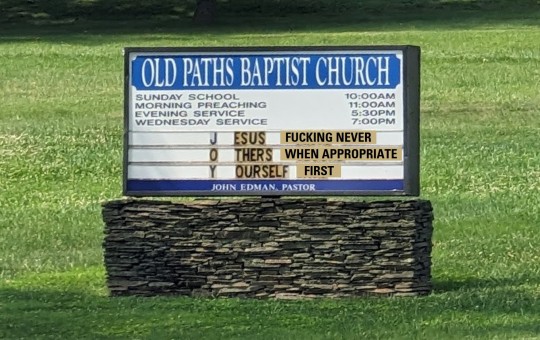
#ex christian#ex fundamentalist#exvangelical#ex religious#xtian#religious trauma#iblp#hillsong#brian houston#bill gothard#youth group#exploitation#christianity sucks#atheist#agnostic#christianity lies
58 notes
·
View notes
Text
Draco and Harry, Dragon and Phoenix: A Drarry Yapperist's Take, Pt. 1
Harry as the Phoenix
hi, this will probably a long-ish one so uhh sit tight
so the dragon and the phoenix are spiritual and cultural symbols commonly seen in the east asian cultural sphere. as far as i know, theyre pretty much depicted as perfect complements to each other. the phoenix is the fire, the dragon is the water, that sort of thing. the dragon and the phoenix appear together in idioms that complement and contrast their individual symbolisms. i think you can start to see how I'll connect the dots between harry, draco, the phoenix, and the dragon later on.
paired together, the dragon and the phoenix represent a harmonious and auspicious pairing. an everlasting marital bliss, if you will. it's why they're used as motifs for the bride and groom in
additionally, the dragon and the phoenix also serve as symbols of the imperial family, specifically of the emperor and empress. a powerful married couple. you see where im getting here ?
for the most part of this entire thing, i will mostly be referencing the east asian symbolism of the phoenix and the dragon. however, i will also draw on the western symbolism of these two for full oomph :D
i was planning on putting the entire thing in one post but harry's section just kept on getting longer that i said eh, fuck it. multiple parts !
and thus i present to you: harry as the phoenix
so, harry and phoenixes.
in the east asian cultural sphere, the phoenix (fenghuang) represents high virtue and grace. it is considered the ruler of all other birds. its rare appearances herald the hope of a new dawn, a new era of peace and prosperity.
harry, as the boy-who-lived and the prophesised one to defeat voldemort, pretty much represents a new dawn for the wizarding world. he is the symbol of their hope against the threat of voldy and many powerful people sought to have him under their thumb for his influence as the chosen one. as the chosen one and the symbol of the light, he is expected to be morally excellent, at least by the standards of the people. they expect him to act a certain way and when he does something that isnt aligned with their image of him, he is condemned harshly. he is also expected to have the grace to easily forgive and forget. to be the bigger person, basically.
onto the other symbolisms of the phoenix ! in the chinese classic text classic of mountains and seas, each part of the phoenix's body also represents a word. the head is virtue, the wing represents duty, the back represents propriety, the abdomen represents credibility, and the tail represents mercy. now all of these terms are intended to be understood in the context of chinese philosophy, but ill likely cover both the western meaning and the chinese philosophical meanings to the best of my understanding.
now you might be thinking "wait only half of those can describe harry" and you're right ! im not going to be looking at them as traits of harry, but as things harry has struggled with during the course of the series.
first we have virtue. now harry isnt the most virtuous person in the story, if at all. his moral compass is kind of whack in a sense that he bases it off his own judgment and rarely on societal expectations, which is kind of what youll expect when youre raised with such golden examples of morality like the dursleys. he is driven by his own definition of justice and regularly has beef with wizarding society. hes judgmental, vindictive, and downright cruel to those he thinks have wronged him in one way or another. he's prideful, he's independent, he doesnt want to be the bigger person. people want him to embody their virtues. he simply doesnt want to. he has his own virtues and he'd pretty much defend them with his life.
and then we have duty. oh boy, duty. duty has been shoved on his person the moment voldy marked harry as his equal. not once has he fully enjoyed the duty of being the boy-who-lived, the chosen one. he hates the fame and the glory and the expectations the title brings. despite this, he still pushes himself to step up to the responsibilities once the adults have proven to be incapable of, well, acting like adults. "if no one will do it, i will" type of thing. he is, however, a compassionate and loyal friend and most of the actions he took to fulfil his responsibilities as the chosen one are fueled by the need to keep his loved ones safe. he wants to do good by them because he cares for them. this tendency of his to do what is good and just based on his own moral compass can actually fit the concept of yi (義) in chinese philosophy if we stretch it just a tad, since hes not working with a predetermined definition of justice.
moving on to propriety. now the propriety mentioned in the classic of mountains and seas is the concept of li (禮) in chinese philosphy and i admit i dont quite understand it yet but its definion is the concrete guide to human action. to my understanding, this would refer to following the structure of society; having proper manners, behaving in the way that you are expected to based on your societal station, deferring to those with higher authority, generally following the established hierarchy. now that is anything but harry. harry does not give a single shit about conforming to social hierarchy. he told draco, who is arguably at the top of the social hierarchy in their year, to fuck off and befriended ron, who is considerably lower in the social ladder, instead. he has no qualms with biting back at authority figures if he feels that they are abusing their power or targeting him. he's damn well a menace to the properly ordered social hierarchy of the wizarding world.
and now we have credibility. "i must not tell lies", anyone ? now harry rarely ever lies. in fact, he tells and defends his truth to the best of his ability. most of the time, he's fighting tooth and nail to prove that he's telling the truth but rarely does anyone believe him right off the bat. this tendency of people viewing him as a liar and attention seeker has driven wedges in his relationships with other people. i think this definitely fuels his tendency to just go and do things by himself since he wld feel that he cant fully trust anyone around him, not even his best friends ron and hermione.
finally, mercy. the translation of ren (仁) to mercy is misleading, in my opinion. ren is more of like working towards an altruistic goal, while also recognising that you are not alone in this goal and that you have people to fall back and depend on in life. now harry is a highly compassionate and kind person. he gravitates towards the underdogs and those who have been dealt with the shorter end of the stick in life. in fact, one of his greatest strengths is how deeply he loves his people. however, he does struggle with sharing his burdens and problems with other people. again, he is the type to do things by himself and has to be reminded that he doesn't need to do everything by himself. he's not used to having people to rely on. he basically raised himself at the dursleys' and then year after year he had to face challenges and solve problems with minimal help from the adults in his life.
facing all of these challenges in life shaped harry into who he is. theyre like painful little puzzle pieces that slowly clicked together until we ended up with a man who is as loving as he is vindictive, who helps his loved ones in any way he can while also refusing help for himself. he never wanted the crown of responsibilities, but he bore the burden nonetheless out of love and compassion.
moving on, while the phoenix (fenghuang) had originally had separate male yang aspect (feng) and female yin aspect (huang), post-qin dynasty saw the fenghuang slowly go through a feminisation process as the dragon (long) became more of a symbol for masculinity. when applying the phoenix's present representation as a feminine entity to harry, this does not mean that i view harry as a stereotypical "female half" of a MLM couple (ew heteronormativity). for me, this represents the overarching positive influence on him: a mother's love.
while harry looks a lot like his father james, for me a lot of him as a person comes from lily. he has lily's eyes, lily's fire, lily's compassion. he is his mother's son. it was his mother's love that spared him from death when he was a baby, and it was another mother's love (narcissa's love for draco) that spared him in the forbidden forest. lily's sacrifice started his story as the boy who lived, narcissa's lie saw it finished. quite nice bookends, dont you think ?
the phoenix is also attributed to fire, death and rebirth. besides the obvious of fire being gryffindor's associated element, fire can also be attributed to harry's determination and courage shown throughout all seven books. he had tragedy upon tragedy, death after death thrown at him and yet none of those ever succeeded in putting out his fire within. not even death itself could keep him down and his revival in the forbidden forest is pretty much like a phoenix's rebirth.
there's also other obvious connections between harry and phoenixes, namely his wand core and his relationship with fawkes, dumbledore's phoenix.
so yeah, harry as the phoenix. most of the connections i made were between harry as a character and the concepts/virtues that have been attributed to the chinese phoenix. harry is like a phoenix where his character is developed through several trials by fire, almost all of which can be connected to a specific concept connected to the chinese phoenix, and he is protected from certain death not once but twice by the love of a mother, a strong feminine force.
thus ends part 1 :3 i hope this all made sense in a way ! feedback and additional thoughts are welcome ;v;b
12 notes
·
View notes
Text
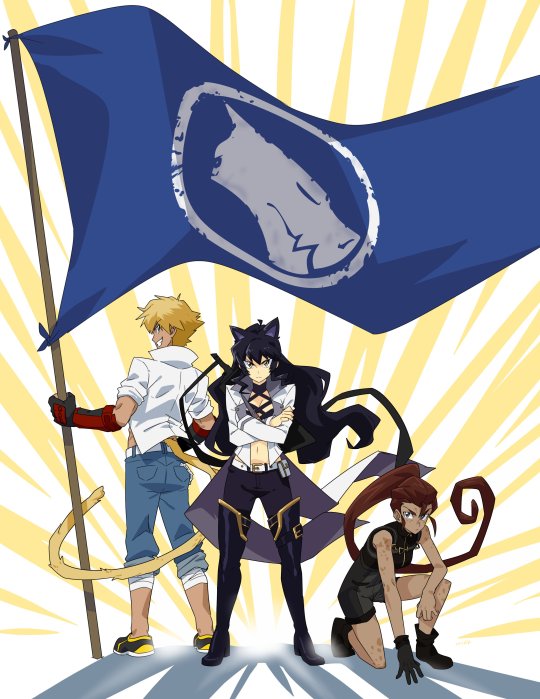
Art by Mikkusushi on Twitter.
I've been sort of entertaining this idea for a while now. Knowing all the unfortunate baggage and mishandling involved with the White Fang, why not just. Make them the good guys?
Say an official rewrite or reboot of RWBY exists in the future - if those two words rub you the wrong way then whatever, basically a clean slate or re-adaptation of RWBY - the fact stands that the White Fang need a heavy revision.
People are smart enough at this point to know that you shouldn't be villainising the oppressed group trying to fight back against a world that is actively pushing them out - if anything the SDC should be more of a antagonistic faction, kind of like the Shinra corporation from Final Fantasy 7 which RWBY is clearly heavily based on, what with Dust and Materia and all that. But that still leaves you with the White Fang and Blake's arc to write.
This has been a large headache point for anyone trying to figure out how to revise RWBY's more fundamental writing flaws, because the WF are such a prominent antagonist faction throughout the Beacon arc and they were such a problem that CRWBY had no choice but to sweep them under the rug entirely after Adam's death. But hear me out here. Do we really need to latch onto that idea so hard? That the White Fang need to be villains?
Like, imagine a RWBY where the White Fang are shown as terrorists on TV and in newspapers throughout Vale, but when you actually meet them, they're a ragtag band of freedom fighters. They're like Avalanche from FF7; the freedom fighters from Sonic SatAM; you start to realise that they're the good guys. They're the embodiment of Chaotic Good or at worst, Chaotic Neutral.
In any other show they'd be the Resistance, the Rebels against an evil corporate empire - they're just not in the main point of view of the story. Going off this change in perception, one would then rewrite everything else based off that foundation.
Putting aside Adam, Ilia and others simply because they're all supplemental to Blake's arc, where does Miss Belladonna herself fit into this?
If we want to keep her backstory as a person atoning for a dark past, then the WF would be more grey in response, but still not outright evil. Revolution is not without sacrifice, and when you're fighting for drastic societal change, conflict is inevitable. While they may fight for a good cause, not everyone has the will or strength to fight, to endure the monumental societal backlash and opposition. Perhaps Blake was one of those people - jaded and burnt out by the never-ending struggle to be heard, losing hope that change would ever be possible - so she runs away in hopes of finding herself, only to be scooped up into Beacon instead.
What would she feel, fighting for the side that, while may not have oppressed the Faunus directly, have remained ambivalent and blind to their struggles? Hunters who claim to fight for human and Faunus alike, but who clearly have more humans in their ranks and would choose to rather save a prosperous human city over a struggling Faunus slum? Would living among humans change her outlook on the fight, where she's torn between reclaiming the hard fight to preserve her own heritage, vs. a relatively comfortable new identity, but one that forces her to assimilate with humankind and live on their terms? Is there a way for her to reconcile these two sides of herself, these two families she's now a part of?
But let's not exclude other possibilities too. Assuming we have a Chaotic Good WF, what if Blake was actually proud to be part of the Fang, and enrolls into Beacon as an unashamed member? Her conflicts would then come from the people around her struggling to accept that - how would Weiss work with someone whose group keeps sabotaging their trains? How would Beacon deal with a public member of the Faunus liberation movement? Would some staunchly oppose her enrolment, while others see it as a possible bridge to better relations with the Faunus? How many Faunus would be inspired by Blake and look up to her as a Faunus-born Hunter, while others would decry and dismiss her as just a hollow figurehead and Remnant's equivalent of a diversity hire?
When seeing other rewrites or revisions of RWBY, I still mainly see people trying to work with the WF as given in canon. They still keep the activism turned to violence and extremism. The WF and thus a majority of Faunus are still portrayed as terrorists and cannon fodder for fights. But what if there's a better way of going about all this?
In the end, this is just an interesting thought exercise, but I leave you with this:

As Blake has said in the manga: "Fangs of pure white need not shed blood." Those words and the imagery they evoke have always stuck with me when I think about the White Fang and how Blake could have been written, and gives such a valuable insight to why the group was named the way it was.
What if they had never strayed from that name? What if they had not been treated by the story as just faceless enemies to mow down by the dozens... but as people from the very beginning?
164 notes
·
View notes
Text
Colby Brock | Lilith Analysis.
–> This GIF is probably the only one I could find that gives off the most Lilith energy aha.

–> In Astrology, Lilith is usually referred to as the "Dark Moon" or the "Black Moon" and represents a mysterious and deeper aspect of our pysche. Lilith is not a physical celestial body like the Sun or the Moon, but is a point in our astrological charts that represent our shadow self, repressed desires and darkest fears. — she's also associated with themes of Rebellion, Independence and Liberation. She is seen as a symbol of feminine power and s*xuality, but is also afraid of rejection and exile.
In Mythology, Lilith is said to be Adam's first wife who refused to be subservient to him, and as a result, she was banished from the Garden of Eden. This story represents Lilith's strong sense of independence and refusal to conform to societal norms.
Wherever Lilith is placed in a person's chart can reveal where they'll feel marginalized, where they'll rebel against authority, their unresolved issues around power and control, where they'll feel an intense sense of shame and guilt, where they feel intimated and where they'll need to confront and embrace their darker sides.
Despite her influence being complex, intense and creating inner turmoil and conflict within us; by acknowledging and working with the energy of Lilith, we can learn to embrace our shadows, reclaim our power and find a deeper sense of self-acceptance and empowerment.
Once we learn to activate our Lilith placement and officially use this to step into our personal power. This includes rejecting almost everything about the way society wants us to be. A better way to phrase this is: “to be in the world, but not of it.” — It's a point where you can powerfully express your uniqueness through.
Colby has his Lilith in the Sign of Leo in the 7th house at the 21st Degree.
First of all, yes, this is most likely where his fear of Commitment shines through, aswell as maybe having tendencies of pushing people away or creating distance to maintain a sense of control. He has a strong desire for freedom and likely has/had struggles with feelings of being confined in a relationship.
Inappropriate relationships, attraction to third party situationships, attraction to the toxic people, being a homewrecker and turning people against eachother are the some of the things that this placement is guilty of. (Not everything, of course, but a good amount.)
I'm guessing he has some sort of desire to be close to someone, but at the same time, he doesn't know how he can do it in a healthy way and since he can feel as if he's incomplete on his own, I guess that he wants to commit, but at the same time he's also deathly afraid of it. He's terrified of losing his freedom yet craving the attention. (Chiron in his 8th and His Moon in Libra play into this)
Also, love triangles and being the third person especially could be prone here.
Is he destined to be alone? No, definitely not but keep in mind that relationships are not easy with this placement. His best relationships are most likely to happen later on in life. (Potentially after the Saturn Return)
Trust and Loyalty is extremely demanded for him in a relationship. possessiveness, envy and manipulation can be triggered here sometimes even after an ended relationship. Unconsciously, he'll want his partner to stay loyal even when a new relationship occurs between one of them.
People with this placement rarely get over any past love. Even when the relationship doesn’t work, he'd rather seek adventures then completely exit the relationship. Then again, this one shouldn't be too suprising because I've never seen a Capricorn placement overcome anything, ever. Lol.
Oh and this is definitely a placement where someone will becomes obsessed with him after a breakup of some sort.
He'll unconsciously be attracted to partners who embody the themes of Lilith. This is especially the case when younger. This could also suggest partners who are in some way unavailable (emotionally or physically)
His Lilith ruler is the Sun which sits in his 11th house, therefore he'll encourage Lilith's influences strongly in matters related to friendships, social networks, and goals and aspirations. There may be a tendency to attract unconventional or disruptive friendships, or to challenge traditional roles and expectations within social groups.
With his Lilith squared to his MC, wild, untamed nature clashes with and his public image or career aspirations. There's a tenstion between expressing his authentic self and conforming to societal expectations. He may struggle with how much of his true self he can reveal in his professional life, or he feels pressured to suppress certain aspects of himself in order to fit in / be successful in his career.
And the opposition to the 1st house suggests that these issues are linked to his sense of self, how he asserts himself in the world and how he struggle with expression his true desires and needs in relationships; leading to conflicts and misunderstandings.
The 7th house is also known for the house of balance and harmony, some more of his key areas he needs to move away from is: people pleasing, being naive, being too nice for his own good, losing himself through the sake of pleasing people, using politeness as a weapon, passive aggressiveness, and manipulation instead of confrontation.
Now for the areas that he's stepping in to activate are: excellent charm and social skills, seeing his own faults in relationships, learning that confrontation is needed, compassion, supportiveness instead of competitivity towards others especially of his gender, seeing his own beauty instead of focusing on others, and setting boundaries.
To him, he may think that love and admiration can only be gained if he does something incredible so his childhood might have molded him into this incredibly ambitious person with big dreams. He feels worthless if he isn't adored and just wants the love and attention that he feels as if he lacks. He can come off as super insecure, super arrogant or even both and most people with this placement hate being alone.
There's also a tendency for him to stir up drama out of boredom so be wary of that.
⁺ ˚ ⋆ 。 ° ✩ ₊ ✩ ° 。 ⋆ ˚ ⁺
Sorry if this one's a little short but I have had a dead arm for the past few days so it's harder to type but also I didn't know what else to write here other than there are some family related issues to this placement and I don't know anything about his family life so I decided to keep those parts out.
I would do one of these for Sam, but I'm honestly unsure of which house his Lilith falls under and I'm back to tracking down his Ascendant which I might post about next.
11 notes
·
View notes
Text
I love cultural differences in the portrayal of zombies in movies/series.
Most western media have slow moving zombies, unfeeling, unthinking. Becoming a zombie is the same as losing the will to live, it's the ultimate example of loss of identity. Narratively they are used as a sort of hive-minded, and are most dangerous in groups (the dangers of going along without formning a personal opinion).
In most asian media becoming a zombie is the ultimate loss of control. We see people succumbing to negative emotions (anger and rage the most common one). Zombies are fast, they are terrifying on their own because of their rage, the force with which they seek to hurt. They use zombies as a symbol of greed, as the embodiment of surpressed rage.
It's the same with all types of monsters. I don't know, I just think it's really interesting how societal ideals and fears seep into our monsters
#zombie#zom 100: bucket list of the dead#zombies#zombie movies#zombie series#happiness drama#sweet home#the walking dead#george romero#night of the living dead#kingdom drama#all of us are dead#theres more i just cant remember rn#western media#asian media
11 notes
·
View notes
Note
when first watching yellowjackets i was expecting jackie to be on the receiving end of some sort of cool twist. she ends up actually becoming antler queen, she’s still alive in the present day and is actually the one who sent the postcards, whatever. but the way she actually went made so much more sense tbh. they fought, they were both too stubborn to go talk to one another after. what happened afterwards so easily could have been prevented. on any other night out there in the woods jackie would have made it through the night and probably made amends w shauna eventually. neither her nor shauna had any idea it was going to snow 😭 i’m honestly so glad they went that route instead of something else because i think it makes shauna’s character and her relationship w jackie so much more devastating.
I couldn't wait to learn more about Jackie's fate but I always hoped it would end up being... banal, almost. But that's exactly why it feels fresh and novel because it's not some noble sacrifice or grandiose moment and like you I think it makes way more sense.
Because, if you're Shauna, how do you get over that? Even before we consider what later seasons will explore regarding other things that happened in the wilderness. And that's just it because if you're Shauna you don't get over that. You're forever haunted by a stupid argument that deffo did have stakes even outside of typical teen drama because don't get me wrong, that convo was raw as fuck and they threw very real things at each other. But, at the end of the day, even the stakes of that argument paled in comparison to their brutal situation. Because you can't act like you would at home, deciding to stay mad at your best friend even though you're stranded and it's Northern Ontario and Jackie doesn't even have the basic survival skills like making fire. And so she freezes even though she didn't have to, even though there was shelter right there. But nature doesn't give a fuck that the girlies are fighting or that both are too proud to resolve this conflict that same evening. That's the harsh reality of the Yellowjackets and of course Jackie would be the first to go this way. The first to die simply because they refused to adapt to that harsh reality.
I'm obsessed with how Jackie represents their old life, both while in the wilderness and of course 25 years later. Jackie is their team captain but she can't hold them together when she's out of her element. Everyone else finds their Thing but Jackie just can't exist in this new world. Looked at another way, she also represents the good side of what they left behind. I was surprised to see how many people wrote Jackie off as the stereotypical Queen Bee and mean girl when she isn't that archetype at all for me. Maybe a bit, yeah, by nature of being the popular girl and team captain but I'm used to the Santana Lopezes of the world (jk there's only one Her) so Jackie was just a normal teenage girl to me. That's the beauty and tragedy of it, because she is the normal teen girl who refuses to let go of real world norms and give in to nature. She's annoying when that manifests in not doing the chores and getting her hands dirty, sure, but she's pretty much the only sane one when the madness starts and she clings to these societal norms. (Natalie is the other sane one but that's another discussion.)
When Jackie dies, it's much more powerful than any twist could have been. Much more powerful than her living or becoming a driving force in the cult stuff. It's simple. It's nature, it's death. It's the first fall of snow and it's the death of the old world order. It's infuriatingly evitable. But, at the same time, it had to happen because of what it symbolizes. Yeah the girls, any of the girls actually could have just realized that Jackie sleeping outside was stupid af and that nature doesn't care about the girlies fighting it will kill anyone who's unprepared. And Jackie was the embodiment of being unprepared. But that's the rawness and sickness and brilliance of it, that no one did go out for Jackie. And Jackie didn't go in because she still lived in New Jersey and for that, she had to die. For Shauna, her last convo with Jackie will never not be that. The fact that she so easily could have saved Jackie will never not hang over her. She lives in the shell of Jackie Taylor's life and refuses to not do that because Jackie will never not be a part of her - or rather, idk if Shauna will ever view herself as not a part of Jackie.
I'm just obsessed with girls who haunt the narrative, ask anyone who's heard me go on about Twin Peaks or Life Is Strange (Before the Storm). Jackie is such a cool character and her and Shauna's bond so messed up and so delicious. I'm just rambling about all these random thoughts I have om Yellowjackets but basically YES I love how this show just makes so much sense thematically and that should really be a given in storytelling but damn does it feel good to actually have it.
#this is not cohesive but i feel like i don't have to be about this show#i just think it's neat#something i can just enjoy but it also makes me THINK#with the things they do and not with what they don't ya know#and that's good#anon#yellowjackets#yellowjackets asks#people who don't stan jackie don't get it#jackie taylor#shauna shipman
85 notes
·
View notes